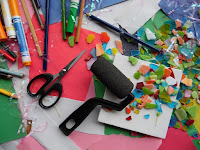Our experiences interact with the creative world on a continuum: at one end we consume or appreciate art; perhaps around the middle we play; and at the other end we create art. At each point on the continuum, we activate different parts of our minds hearts and spirits; it's likely that the greatest opportunity for cultivating resilience lies in the most active point - in creating art.
This is interesting to me on a personal level. A couple of years ago, shortly after my mother died, I joined a local art class. For me, spending time each day drawing and painting, I came to manage my grief and to build resilience. The creating definitely worked!
Let's think about play - this is something we do for fun, not because it helps us to reach a goal. We know that play shapes our brains, makes us smarter and more adaptable, fosters empathy and makes possible complex social groups. In humans play lies at the core of creativity and innovation. Children are experts at play because it's natural and instinctive to them. However when we get older, we often come to see play as a waste of time - we focus instead on being productive! The interesting thing about play, however, is that it's improvisational, so we are open to doing things in new ways and we get new ideas from it. We know that play relieves stress, improves relationships by fostering empathy, compassion and trust, and that it improves brain function and so can prevent memory problems. Play boosts creativity and also helps us to learn new tasks quicker because it's fun. I think about the years my son was "forced" to learn Spanish in a traditional way at school (it failed - he didn't master it) and yet as an adult he was motivated to use Duolingo for 15 minutes every morning to learn Spanish through play.
Creating art is also important - our early ancestors decorated the walls of their caves, made music and danced. Today we know that art is also a vehicle for connection and empathy; it combats loneliness, alienation and dehumanisation and it has long been an essential tool for social justice. Numerous studies also show that creative activities such as drawing, knitting and writing raise serotonin levels and decrease anxiety.
As many of you know, I visit a lot of schools. I'm always sad that the arts subjects have been pushed out of the curriculum and are seen as optional as opposed to the "real work" of schools. I see this happening with play too - with schools cutting back on recess time. With what we know about the importance of both creativity and play being important builders of resilience, perhaps it's time to reverse these trends.
Photo credit: Elissa Capelle Vaughn on Pixabay

No comments:
Post a Comment